OCZ Agility 3 (240GB) Review
by Anand Lal Shimpi on May 24, 2011 2:53 AM ESTAnandTech Storage Bench 2011
I didn't expect to have to debut this so soon, but I've been working on updated benchmarks for 2011. Last year we introduced our AnandTech Storage Bench, a suite of benchmarks that took traces of real OS/application usage and played them back in a repeatable manner. I assembled the traces myself out of frustration with the majority of what we have today in terms of SSD benchmarks.
Although the AnandTech Storage Bench tests did a good job of characterizing SSD performance, they weren't stressful enough. All of the tests performed less than 10GB of reads/writes and typically involved only 4GB of writes specifically. That's not even enough exceed the spare area on most SSDs. Most canned SSD benchmarks don't even come close to writing a single gigabyte of data, but that doesn't mean that simply writing 4GB is acceptable.
Originally I kept the benchmarks short enough that they wouldn't be a burden to run (~30 minutes) but long enough that they were representative of what a power user might do with their system.
Not too long ago I tweeted that I had created what I referred to as the Mother of All SSD Benchmarks (MOASB). Rather than only writing 4GB of data to the drive, this benchmark writes 106.32GB. It's the load you'd put on a drive after nearly two weeks of constant usage. And it takes a *long* time to run.
I'll be sharing the full details of the benchmark in some upcoming SSD articles but here are some details:
1) The MOASB, officially called AnandTech Storage Bench 2011 - Heavy Workload, mainly focuses on the times when your I/O activity is the highest. There is a lot of downloading and application installing that happens during the course of this test. My thinking was that it's during application installs, file copies, downloading and multitasking with all of this that you can really notice performance differences between drives.
2) I tried to cover as many bases as possible with the software I incorporated into this test. There's a lot of photo editing in Photoshop, HTML editing in Dreamweaver, web browsing, game playing/level loading (Starcraft II & WoW are both a part of the test) as well as general use stuff (application installing, virus scanning). I included a large amount of email downloading, document creation and editing as well. To top it all off I even use Visual Studio 2008 to build Chromium during the test.
Update: As promised, some more details about our Heavy Workload for 2011.
The test has 2,168,893 read operations and 1,783,447 write operations. The IO breakdown is as follows:
| AnandTech Storage Bench 2011 - Heavy Workload IO Breakdown | ||||
| IO Size | % of Total | |||
| 4KB | 28% | |||
| 16KB | 10% | |||
| 32KB | 10% | |||
| 64KB | 4% | |||
Only 42% of all operations are sequential, the rest range from pseudo to fully random (with most falling in the pseudo-random category). Average queue depth is 4.625 IOs, with 59% of operations taking place in an IO queue of 1.
Many of you have asked for a better way to really characterize performance. Simply looking at IOPS doesn't really say much. As a result I'm going to be presenting Storage Bench 2011 data in a slightly different way. We'll have performance represented as Average MB/s, with higher numbers being better. At the same time I'll be reporting how long the SSD was busy while running this test. These disk busy graphs will show you exactly how much time was shaved off by using a faster drive vs. a slower one during the course of this test. Finally, I will also break out performance into reads, writes and combined. The reason I do this is to help balance out the fact that this test is unusually write intensive, which can often hide the benefits of a drive with good read performance.
There's also a new light workload for 2011. This is a far more reasonable, typical every day use case benchmark. Lots of web browsing, photo editing (but with a greater focus on photo consumption), video playback as well as some application installs and gaming. This test isn't nearly as write intensive as the MOASB but it's still multiple times more write intensive than what we were running last year.
As always I don't believe that these two benchmarks alone are enough to characterize the performance of a drive, but hopefully along with the rest of our tests they will help provide a better idea.
The testbed for Storage Bench 2011 has changed as well. We're now using a Sandy Bridge platform with full 6Gbps support for these tests. All of the older tests are still run on our X58 platform.
AnandTech Storage Bench 2011 - Heavy Workload
We'll start out by looking at average data rate throughout our new heavy workload test:
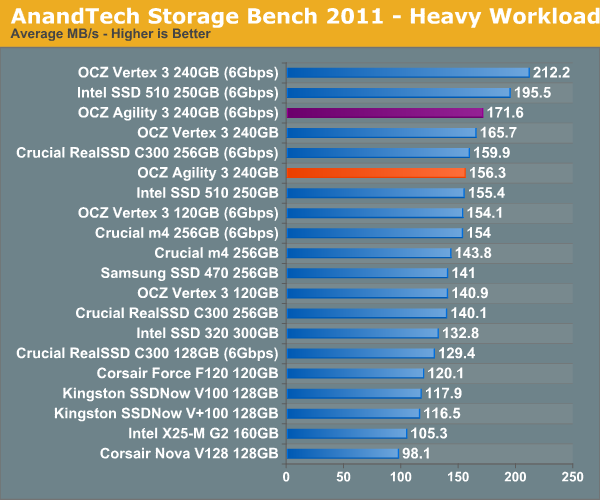
Our heavy workload has quite a bit of compressed reads/writes, which are where the Agility 3 is going to struggle the most. The 240GB Agility 3 performs more like an Intel SSD 510 here rather than a Vertex 3. The Agility 3 is still a respectable performer, definitely faster than the old Vertex 2, but it's definitely not as quick as the new Vertex 3.
The breakdown of reads vs. writes tells us more of what's going on:
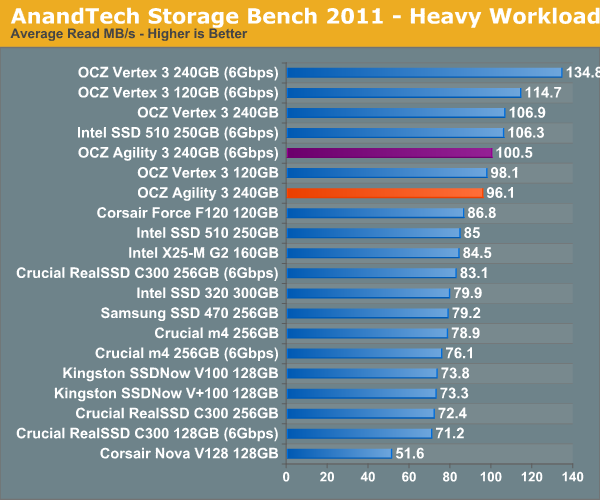
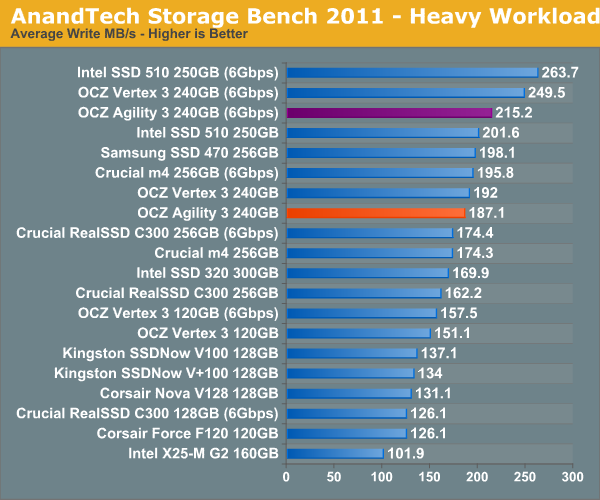
The next three charts just represent the same data, but in a different manner. Instead of looking at average data rate, we're looking at how long the disk was busy for during this entire test. Note that disk busy time excludes any and all idles, this is just how long the SSD was busy doing something:
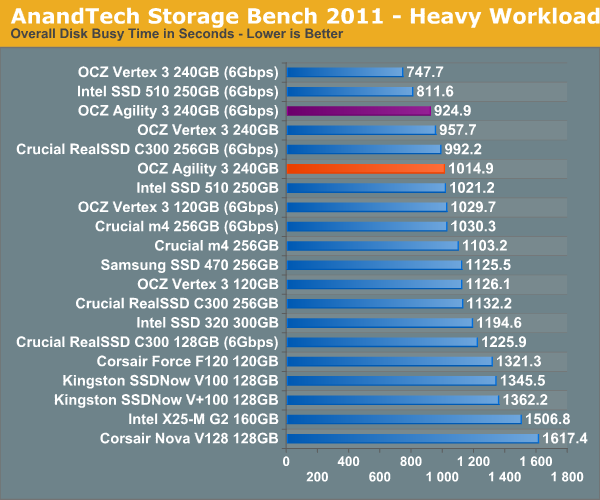
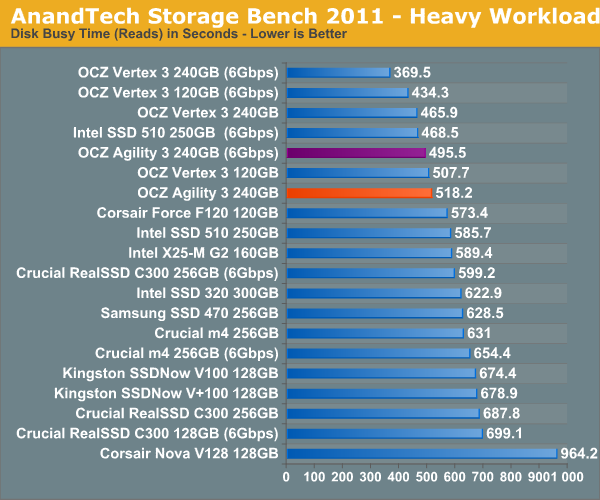
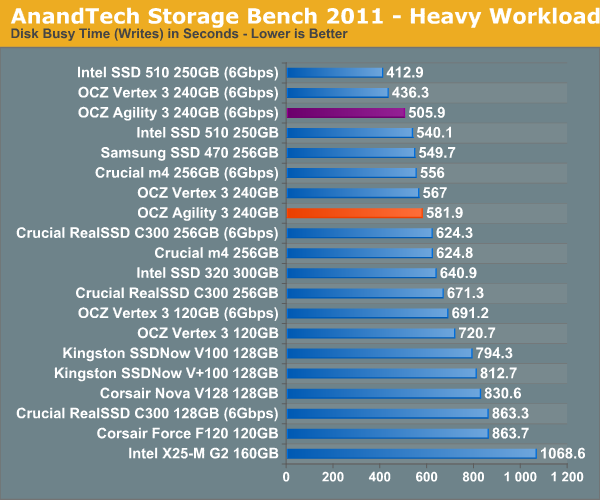










59 Comments
View All Comments
cactusdog - Tuesday, May 24, 2011 - link
Anand can you get hold of the new Corsair Force series 3, preferably the GT version to test?A lot of us are waiting for a non-ocz sandforce 6 GBs drive.
Reiker - Tuesday, May 24, 2011 - link
I agree! I would really like to know if there will be ANY 120Gb SF2k drive that is up to spar with the 240Gb version...Love the work you´re doing Anandtech!
Minion4Hire - Tuesday, May 24, 2011 - link
I'd like to see how much of a performance difference exists between the 60 GB and 240 GB Agility 3s. I don't need 240 GBs for my OS and my important apps, so I'd be more interested in two or three 60 GB drives in RAID 0.... assuming the drives aren't horribly crippled and I'm not bandwidth limited by my controller.Mr Perfect - Tuesday, May 24, 2011 - link
Yes, please. The Force drives look interesting.Also, in the opening you touched briefly on the importance of the 64GB drives, could you test them as well? Looking at the difference between the 240GB and 120GB drives, you can't help but wonder what the 64GB drives will end up like.
Dracusis - Tuesday, May 24, 2011 - link
Yeah, Anand's SSD reviews are the best, they really make me feel like I know what I'm buying into. Would love to see more SF-2200 series drives benchmarked and discussed. Some performance numbers/thoughts on the Agility 3 60GB & 120GB variants would be nice too as there's a lot of performance differences between the Vertex 3 120 vs 240.Having all the Corsair Force 3's new drives on here would be brilliant - It must take a hellish amount of time to do all of these benchmarks though.
MrSpadge - Tuesday, May 24, 2011 - link
A roundup of 60 GB drives would be nice: Agility 3, Solid 3, some Sandforce 2 (34 and/or 25 nm) and Crucial C300 and C400.MrS
dhanson8652 - Tuesday, May 24, 2011 - link
+1 on the 60/64GB roundup. Definitely want to see those and the 120/128GB for any that don't fit like the X25V/M, Intel 320.Oxford Guy - Tuesday, May 24, 2011 - link
What I don't understand is why we have reviews of the 240 GB Vertex 3 and the 240 GB Agility 3 and yet...The 240 GB Vertex 2 is nowhere to be found in the charts!
anonapon - Tuesday, May 24, 2011 - link
I'm really interested in a review of the Corsair Force 3, too, or of any new Sandforce drive which can play well with the IRST drivers, which the OCZ V3 doesn't seem to do with consistency.gayannr - Tuesday, May 24, 2011 - link
Does Intel Stand a chance ? Probably NO! :-/